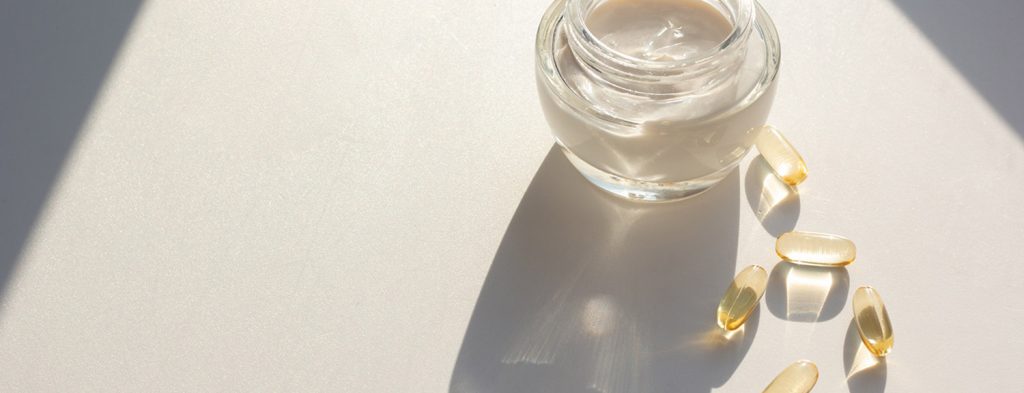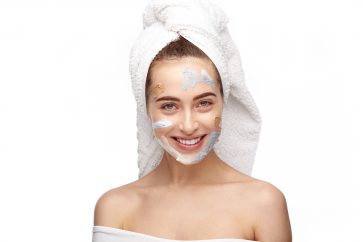Our Favourites
Best Overall :
Carrot & Stick The Repair Cream
SECOND:
Formulyst Active Serum
- Sephora Buy now for $105
- Amazon Buy now for $104
- Walmart Buy now for $106
- Ulta Buy now for $102
When you think of ingredients in anti-aging creams, you probably think of retinol, peptides, and hyaluronic acid. But what about vitamin E? While vitamin E may not be the most exciting skin care ingredient, it definitely plays a very important role in maintaining healthy, youthful skin. But there’s a few things you need to know before you start using a vitamin E cream for skin. For instance, what exactly is vitamin E? What benefits does vitamin E provide the skin? Who should use a vitamin E cream for skin, and who should avoid it? We’ve got the answers to these questions and more below!
What exactly is vitamin E?
Did you know that the term vitamin E actually refers to a group of eight nutrients that all have similar structures yet slightly different functions? There are four tocopherols and four tocotrienols; all eight compounds may be correctly referred to as “vitamin E”. Out of these eight compounds, alpha-tocopherol is the most abundant and biologically active form in the human body.
Related: Best Face Mositurizers
When searching for a vitamin E cream, you may notice that the list of ingredients does not actually say “vitamin E”. Rather, it may show one of these common forms of vitamin E: d-alpha-tocopherol, d-alpha-tocopheryl acetate, dl-alpha tocopherol, and dl-alpha tocopheryl acetate. The “d” prefix in front of the “alpha” indicates that the ingredient was derived from natural sources, such as vegetable oils, nuts, or seeds. The “dl” prefix indicates that the ingredient was created from a synthetic base. Research has determined that natural forms of tocopherol are more effective than the synthetic versions, but both exhibit antioxidant activity.
Best Bet
How does vitamin E benefit the skin?

Vitamin E is naturally found in human skin, and is actually considered to be the major lipid (fat) soluble antioxidant in the skin. Due to its role in maintaining healthy skin, vitamin E has been used in various types of skin care products for more than 50 years. So how exactly does vitamin E benefit the skin? Below are the top 4 benefits of using a vitamin E cream for skin.
- Provides potent antioxidant activity. One of the main reasons to use a vitamin E cream is due to its powerful antioxidant activity. Vitamin E is classified as a “chain-breaking” antioxidant for its role in hindering the chain reaction induced by free radicals. Specifically, vitamin E works by delivering a hydrogen atom to free radicals, which minimizes their damaging effects. Since vitamin E is lipid soluble, it is incorporated into cell membranes in order to protect from oxidative damage. This is important because free radicals are unstable, highly reactive molecules that contribute to signs of aging, such as fine lines, wrinkles, sagging skin, and age spots.
- Helps other antioxidants perform better. The antioxidant activity of vitamin E can actually become more powerful when combined with ascorbic acid (vitamin C). For this reason, vitamins C and E are referred to as “network antioxidants”. A publication in the journal Dermatologic Therapy explains, “because vitamin C regenerates oxidized vitamin E, the combination in a cosmeceutical formulation is synergistic – particularly in UV protection.” In addition, research studies have reported that vitamin C enhances UVA protection, whereas vitamin E is more effective against UVB radiation. Therefore, when these antioxidants are combined there is strengthened UVA/UVB protection when worn under sunscreen.
- Protects against UV-induced skin damage. According to a publication in the journal Nutrients, vitamin E’s activity as an antioxidant in combination with its presence in human skin means it’s possible that vitamin E may protect the skin from UV damage. There is evidence that topically applied vitamin E, specifically alpha-tocopherol, provides photoprotective activity against acute UV-induced skin damage, such as erythema (redness) and edema (swelling). Additionally, alpha-tocopherol can protect the skin from responses to chronic UVA and UVB exposure, such as wrinkles and skin cancer.
- Strengthens the skin barrier. In addition to its powerful antioxidant activity, vitamin E helps the skin retain moisture by strengthening the skin’s barrier function. When tocopherol is delivered to your skin through the sebaceous (oil) glands, it improves water-binding capacity and hydrates the stratum corneum (the uppermost layer of skin). It is also considered an effective ingredient for providing skin protection and treating atopic dermatitis (eczema).
Who should use vitamin E cream for skin, and who should avoid it?

A vitamin E cream can be beneficial for almost every skin type. Those with mature skin may want to consider using a vitamin E cream for its powerful antioxidant effects, which can help prevent the formation of fine lines and wrinkles. If you have dry skin or eczema, a vitamin E cream could be beneficial since it strengthens the skin barrier and improves moisture retention. Lastly, if you’re going to spend a lot of time in the sun, you can further protect your skin by using a vitamin E cream underneath your sunscreen.
So is there anyone who should avoid using a vitamin E cream? It turns out that vitamin E can act as an allergen to some (although it’s pretty uncommon) which means that those with very sensitive skin may want to perform a patch test before using a vitamin E cream. It is also recommended that those with oily and/or acne-prone skin avoid using a vitamin E cream. Remember how we explained that vitamin E is lipid soluble? Well, that means it easily penetrates into your pores and may lead to clogged pores, particularly if your skin is already oily. While a small amount of vitamin E should be fine, higher concentrations of vitamin E in skin care products may contribute to clogged pores and acne breakouts.
Should you use vitamin E for scars?
Vitamin E cream is often touted to be a natural remedy for the prevention and treatment of scars. It’s a vitamin, so that means it’s a safe and natural way to treat scars on your own, right? Actually, science has proven otherwise. Several research studies have shown that vitamin E not only fails to help with scars but can actually worsen their appearance. For example, a study by researchers Baumann and Spencer evaluated the effect of topically applied vitamin E on the cosmetic appearance of scars after skin cancer removal surgery. After 4 weeks, it was determined that 90% of patients’ scars were not improved and some actually worsened with use of topical vitamin E. The reason why some scars worsened after application of vitamin E was due to a type of allergic reaction called contact dermatitis, which can exacerbate scarring. Overall, the study concluded that vitamin E does not help improve the cosmetic appearance of scars and leads to a high incidence of contact dermatitis. While it’s clear that vitamin E plays an important role in the health of your skin, it turns out that you can have too much of a good thing.
Best Vitamin E Serums
BEST: Carrot & Stick The Repair Cream, $80
A proprietary probiotic formulation combined with Vitamin E are the hero ingredient in this formula. It keeps skin looking hydrated and visible issues diminished.
Niacinamide is the hero ingredient in this ingredient-packed formula, so it’s perfect for lightening any discoloration that pops up in your 40s. It visibly lifts, tightens, and firms while defending against damaging free radicals. Hyaluronic acid and vitamin E deliver an instant boost of hydration, and a blend of synthesized growth factors encourages elasticity, cell turnover, and nutrient absorption to support revitalization.
Seven plant-based neuropeptides enhance the skin’s structural integrity from the inside out, promoting smoother, more resilient-looking skin. Finally, soothing and brightening botanicals impart an ageless glow, including chamomile, licorice root, and green tea.
Best Bet
Formulyst Active Serum, $80
As you can see, vitamin E is an exceptional skin care ingredient. While there are plenty of skin care products that contain vitamin E, we think the best is the Formulyst Active Serum. This powerhouse is packed with vitamin B, C, E, ferulic acid and niacinamide to help protect skin and keep it looking clear, glowing, and vibrant. The potent blend helps fight free radical damage, tackles hyperpigmentation, and leaves skin looking smooth and hydrated. In other words, it does a little bit of everything.
References:
Wikipedia “Vitamin E”; Nutrients 2010 Aug; 2(8): 903–928; Dermatol Surg 1999 Apr;25(4):311-5




